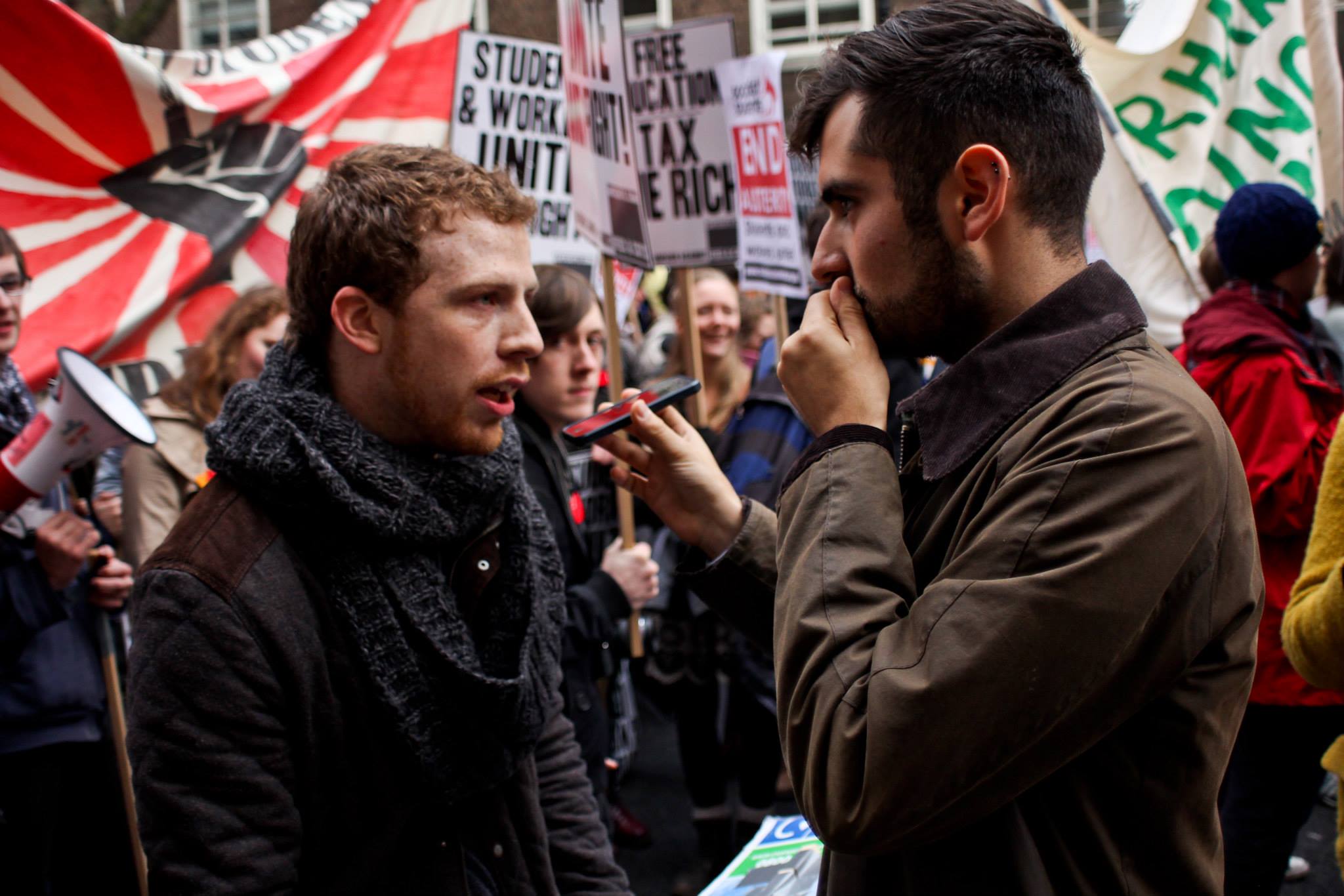Cuts, occupations, strikes, suspensions, demos and even riot police. The last academic year at Sussex had it all. This week, one student activist offers a retrospective account of 2010-11

Laying out the Objective to The Spirit of Utopia (1918, 1923), the German Marxist philosopher Ernst Bloch observed: “What just was will probably soon be forgotten. Only an empty, awful memory hangs in the air.”
University campuses play strange games with the memory. The libraries and the archives are mnemonic storehouses of knowledge – although perhaps nowadays it is more appropriate to call them clearing houses – but what of the more ephemeral kinds of experience, those prone to atrophy and the silence(s) of forgetting? If the campus is, or should be, a pure means to critical endeavour, then it is all the more cheerless that students should come and go with alarming regularity. Some move on to the quiet oblivion of an office, or a trading floor; others never quite leave.
If you are in your first year, you might be happily oblivious to the so-called re-structuring which the university management forced upon the university community in 2009/10. But to those of us who were there, and who were part of the events as they unfolded, we are left with a dilemma, an unresolved grief and many unsettled questions. The dilemma is this: How are we to pass on the narrative of struggle against injustice and managerial malfeasance in the hope that their wrongs will be righted by the generations to come?
In the previous academic year, unbeknownst to anyone at the time, events at the University of Sussex foreshadowed the wave of student activism, protests and occupations that broke in the closing months of 2010. At Sussex, four occupations took place between October 2009 and March 2010 – two on the top floors of Bramber House, one in Sussex House and, then, a week-long occupation of the Asa Briggs Arts A1 lecture theatre. There were countless more demonstrations and marches across campus, many of which were covered in both the Badger and the local Brighton Argus newspaper. So what provoked this anticipatory burst of activity?
At the beginning of the year, the Vice-Chancellor’s Executive Group (VCEG) had made it clear that they planned to make over 100 university employees redundant – in order to deal with a budget deficit of their own making. These plans would affect both academics and support staff; moreover, as if to demonstrate their intransigence and unwillingness to enter into serious negotiation with the Students’ Union and other campus trade unions, VCEG made it clear that they would be seeking to implement these redundancies on a compulsory basis. The results of the VCEG brainwave are currently being lived out on campus in the form of an increased teaching burden for those who remain and a diminution in course content. The hypocrisy of asking students to fill in ‘satisfaction questionnaires’ and to complete surveys which aim to quantitatively measure the ‘student experience’ – however vacuously or broadly the category might be defined – is that the current crop of students have no benchmark against which to measure their experience. The empirical survey runs up against its own unperceived limits as soon as one tries to reach beyond the narrow horizon of the continuous present.
Whilst working on a check-out in Homebase during my GCSEs, a customer once asked me: “don’t you think standards are slipping; aren’t GCSEs much easier nowadays than O-Levels were in my day?” – or words to that effect. The only honest answer I could give was that I didn’t know. Quite simply, students who have only recently arrived at Sussex cannot know what they are missing. Therein lies the hypocrisy of the VCEG’s widely-touted propaganda statistics.
Some of the staff made redundant in the English faculty, for example, won prestigious teaching awards in the very same year that they were being told they were now surplus to requirements. Make no mistake though: none of this should for a second call into question the continuing dedication and commitment of the staff that remain.
When students in 2009 learned that the university management were planning to take away the jobs of their lecturers and seminar conveners, many of them decided to come together to discuss their responses and, more importantly, to try to organise against these plans which would have such a devastating effect on the university community. It continues to seem grossly unfair, for example, that university managers should earn in excess of £100, 000 at the same time as they force redundancies on their colleagues. The students’ campaign took the name ‘Sussex Stop the Cuts’; the campaign’s blog continues to be updated at: www.defendsussex.wordpress.com.
One of the most controversial decisions taken by VCEG in response to the student campaign related to a demonstration on 3 March and the occupation of Sussex House which followed it. Sussex House is the university’s central administrative building which also contains the office of the Vice-Chancellor. Around 70 students are estimated to have taken part in the occupation, whilst many more gathered outside in support. The university management responded by calling police onto campus who proceeded to violently attack some of the students: footage of these events is posted on the Badger website at: www.thebadgeronline.co.uk.
In a witness statement to the High Court (dated 3 March), the University Registrar John Duffy requested an injunction on the grounds that protesting students “have locked key members of staff, including myself, in their offices against their will” [point 11] and that they “are holding key members of the university’s staff hostage”. On the basis of this witness statement, a High Court Injunction was granted criminalising all “occupational forms of protest” on campus. Duffy’s claims, however, were strongly contested by students who pointed to evidence that people were free to leave at any time. Interestingly, statements emanating from Sussex House in response to Freedom of Information requests have failed to repeat allegations about hostage-taking. A very large question mark continues to linger over Duffy’s original witness-statement.
VCEG were panicking. Like caged animals, they began to lash out and show their teeth. They knew their plans were intensely unpopular with staff and students and they knew that Sussex UCU had come up with concrete alternative proposals (which VCEG decided to ignore). In an attempt to intimidate student protesters, perhaps hoping that the nuisance might be made to go away, VCEG controversially suspended six students on 4 March under the draconian Statute V of the University’s constitution. But the nuisance did not go away. In open defiance of the injunction, a 700-strong solidarity demonstration took place on 11 March and over 300 students went back into occupation to demand the unconditional re-instatement of the Sussex Six. Significantly, the news soon spread to other universities: students in Aberdeen, Goldsmiths, Strathclyde and Nottingham all sent messages of solidarity, photos and videos of students holding ‘I Occupied Sussex House’ placards. The statement was intended to illuminate the arbitrary way in which six students had been singled out and unfairly victimised for a collective action which had involved many, many more people. An Emergency General Meeting of the Students’ Union was called and, with a few days’ notice, a record-breaking 850 students packed into Mandela Hall on 17 March to vote No Confidence in VCEG, to demand an independent inquiry, and to demand re-instatement for the six suspended students. On 18 March, the students were re-instated, following pressure from the University Senate and the Students’ Union EGM, on the same day as the University and College Union had come out on strike against VCEG’s redundancy proposals. The news of the students’ re-instatement resounded round the picket lines to the delight of both striking lecturers and concerned students.
In the ensuing disciplinary hearings for the six students, the charges of riotous disorder and violent, intimidating conduct were dropped, but they were fined between £150-300 each for disrupting the working of staff for one afternoon. VCEG’s actions, however, have disrupted – and continue to disrupt – the university community for a much longer period than a single afternoon. Many questions remain open. Senate, for example, added its name to the call for an independent inquiry on 17 March – only the VC and other members of senior management voted against this call.
Why, one wonders? What do they have to hide?
On 25 June, a petition was circulated by Tom Wills (then Students’ Union president) reiterating the call to establish an independent, rather than management-led, inquiry into the events. Within the space of two days, it attracted 60 academic signatories. The petition was sent to Senate, which reiterated its call for an independent inquiry. The following week, Council met. Whilst in Senate there are academics and other members of staff, in Council most members are ‘independent’, i.e. outsiders. Few academics sit on it. There, again, senior management hoped the issue would be buried. However, in part thanks to the reiterated call from Senate and Wills’ petition, Council decided it would form a working group to report to its next session (in December) on the pros and cons of setting up an inquiry. The working group (comprising half a dozen members drawn from Council and Senate) met in September. And thus was the threat of an independent inquiry bureaucratically obfuscated and administratively coddled into inexistence.
In The Book of Laughter and Forgetting (1979), writing about the distortions and deceptions of Stalinist historiographic practice, Milan Kundera reminds us that: “[t]he first step in liquidating a people is to erase its memory.
Destroy its books, its culture, its history, Then have somebody write new books, manufacture a new culture, invent a new history. Before long the nation will begin to forget what it is and what it was. The world around it will forget even faster […]. The struggle of man against power is the struggle of memory against forgetting.”
By now, VCEG are probably hoping that the heat has died down. They are probably hoping that all thoughts of an independent inquiry have vanished from the minds of the forgetful, the uninitiated and the indifferent. Now is precisely the time to remind them of what they did last spring. Only defeated people don’t sing.




